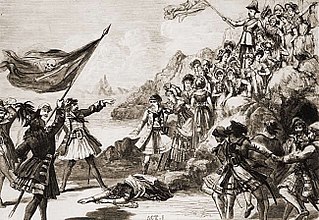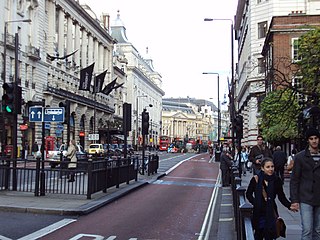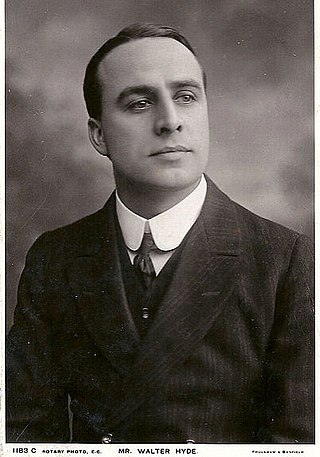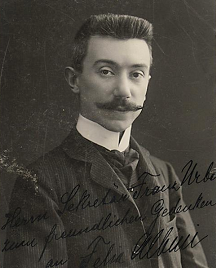
The Pirates of Penzance; or, The Slave of Duty is a comic opera in two acts, with music by Arthur Sullivan and libretto by W. S. Gilbert. Its official premiere was at the Fifth Avenue Theatre in New York City on 31 December 1879, where it was well received by both audiences and critics. Its London debut was on 3 April 1880, at the Opera Comique, where it ran for 363 performances.

Piccadilly is a road in the City of Westminster, London, England, to the south of Mayfair, between Hyde Park Corner in the west and Piccadilly Circus in the east. It is part of the A4 road that connects central London to Hammersmith, Earl's Court, Heathrow Airport and the M4 motorway westward. St James's is to the south of the eastern section, while the western section is built up only on the northern side. Piccadilly is just under 1 mile (1.6 km) in length, and it is one of the widest and straightest streets in central London.

Kirsten Malfrid Flagstad was a Norwegian opera singer, who was the outstanding Wagnerian soprano of her era. Her triumphant debut in New York on 2 February 1935 is one of the legends of opera. Giulio Gatti-Casazza, the longstanding General Manager of the Metropolitan Opera said, “I have given America two great gifts — Caruso and Flagstad.”

Virginia Mayo was an American actress and dancer. She was in a series of popular comedy films with Danny Kaye and was Warner Bros. biggest box-office draw in the late 1940s. She also co-starred in the 1946 Oscar-winning movie The Best Years of Our Lives.

Leonard Mudie was an English character actor whose career lasted for nearly fifty years. After a successful start as a stage actor in England, he appeared regularly in the US, and made his home there from 1932. He appeared in character roles on Broadway and in Hollywood films.

Percy Reginald Lawrence-Grant was an English actor known for supporting roles in films such as The Living Ghost, I'll Tell the World, Shanghai Express, The Mask of Fu Manchu and Son of Frankenstein. He was host of the 4th Academy Awards ceremonies in 1931.

The Gerald Schoenfeld Theatre, formerly the Plymouth Theatre, is a Broadway theater at 236 West 45th Street in the Theater District of Midtown Manhattan in New York City. Opened in 1917, the theater was designed by Herbert J. Krapp and was built for the Shubert brothers. The Schoenfeld Theatre is named for Gerald Schoenfeld, longtime president of the Shubert Organization, which operates the theater. It has 1,079 seats across two levels. Both the facade and the auditorium interior are New York City landmarks.

The 5th Avenue Theatre is a landmark theatre located in the Skinner Building, in the downtown core of Seattle, Washington, United States. It has hosted a variety of theatre productions and motion pictures since it opened in 1926. The building and land are owned by the University of Washington and were once part of the original campus. The theatre operates as a venue for nationally touring Broadway and original shows by the non-profit 5th Avenue Theatre Association.

Frank Reicher was a German-born American actor, director and producer. He is best known for playing Captain Englehorn in the 1933 film King Kong.

The Emerald Isle; or, The Caves of Carrig-Cleena, is a two-act comic opera, with music by Arthur Sullivan and Edward German, and a libretto by Basil Hood. The plot concerns the efforts of an Irish patriot to resist the oppressive "re-education" programme of the English, which has robbed the Irish of their cultural heritage. A quirky "Professor of Elocution" who is hired by the English to continue this "re-education" of the Irish switches sides to help the Irish defend their culture. Romantic complications cause a confrontation between the Irish patriots and the superstitious English at the supposedly haunted caves of Carric-Cleena, and disguises are employed to hold the English off; but the professor ultimately comes up with a solution that works out happily for all.

Walter Henry Passmore was an English singer and actor best known as the first successor to George Grossmith in the comic baritone roles in Gilbert and Sullivan operas with the D'Oyly Carte Opera Company.

The Orchid is an Edwardian musical comedy in two acts with music by Ivan Caryll and Lionel Monckton, a book by James T. Tanner, lyrics by Adrian Ross and Percy Greenbank, and additional numbers by Paul Rubens. The story concerns marital mix-ups and the quest of a wealthy man for a $2,000 Peruvian orchid to be sent to France. When foul play keeps the flower from reaching its destination, it is discovered that a nearly identical orchid is growing in the garden of the horticultural college.

Der Graf von Luxemburg is an operetta in three acts by Franz Lehár to a German libretto by Alfred Willner, Robert Bodanzky, and Leo Stein. A Viennese take on bohemian life in Paris at the beginning of the 20th century, the story revolves around an impoverished aristocrat and a glamorous opera singer who have entered into a sham marriage without ever seeing each other and later fall in love at first sight, unaware that they are already husband and wife.

Margaret Rawlings, Lady Barlow was an English stage actress, born in Osaka, Japan, daughter of the Rev. George William Rawlings and his wife Lilian Rawlings.
Giorgio Madia is an Italian choreographer and stage director active in the fields of opera, ballet, operetta, musical and event.

Walter Hyde was a British tenor, actor and teacher of voice whose career spanned genres from musical theatre to grand opera. In 1901 he sang Borrachio in the premiere of Stanford's Much Ado About Nothing and soon appeared in London's West End in light opera and Edwardian musical comedy. He appeared regularly at the Royal Opera House in Covent Garden between 1908 and 1924, becoming known for roles in Wagner operas, among others, both in Britain and America. He was also in demand as a concert artist. In his later years he was Professor of Voice at the Guildhall School of Music where his students included Geraint Evans and Owen Brannigan.

Caroline Gertrude Hatchard was a British lyric soprano, musical theatre and opera singer of the 20th-century who was the first English-born and trained soprano to be engaged by the Royal Opera House in Covent Garden where she played Sophie in the British premiere of Strauss's Der Rosenkavalier on 29 January 1913 with Thomas Beecham conducting.

Marie George was an American actress, singer and stage beauty who had a successful career first in New York City and later in London, England during the Edwardian era.

Srećko (Felix) Albini was a Croatian composer, conductor, and music publisher. He was primarily known for his operettas, some of which were adapted into English and performed in London and New York.




















